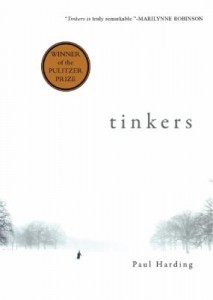 Could’ve Used A Bit More Tinkering
Could’ve Used A Bit More Tinkering
Harding, Paul. (2009). Tinkers. New York: Bellevue Literary Press.
This short (191 pp) Pulitzer Prize-winner has a great opening line: “George Washington Crosby began to hallucinate eight days before he died.” Much of the imagery in this story is hallucinatory.
George drifts in and out of reverie, remembering his harsh childhood in 1920’s (?) rural Maine, as well as his adult life fixing old clocks. He also recalls his father, Howard, a traveling horse-and-buggy salesman of the 19th century, bringing safety pins and soap to remote country dwellers, in exchange for a few pennies. Howard was also a tinker, a fixer of things, and an epileptic. He and his wife tried to hide the seizures from the children, but George knew something was wrong. The wife was resentful of the hard life Howard provided for the family. Howard’s epileptic seizures are beautifully described and as hallucinatory as George’s. Then George dies, and that’s it.
It’s a very self-consciously “literary” novel, with often seemingly strained lyrical language and basically no story. The poetic mood is the strong point of the text, some of the hallucinatory imagery especially well-rendered. Beyond that however, the writing is not great. In several places there are undocumented shifts in tense, time-period, style, point of view, and narrative mode, from first-person to second-person, to third-person and back. Maybe that’s supposed to be “artistic,” but it’s also disjointed and often confusing.
Characters are revealed in unconnected vignettes, as real memory often feels, but the characters don’t change and are not motivated by anything. Howard implausibly deserts his wife and family when he learns she is planning a mental institution for him, but that’s about the extent of character development.
“Light skin of sky and cloud and mountain on the still pond. Water body beneath teeming with reeds and silt and trout (sealed in day skin and night skin and ice lids), which we draw out with silk threads, fitted with snags of fur or bright feathers. Skin like glass like liquid like skin; our words scrieved the slick surface (reflecting risen moon, spinning stars, flitting bats) so that we had only to whisper across the wide plate.” (p. 45).
Great writing, or word salad?
